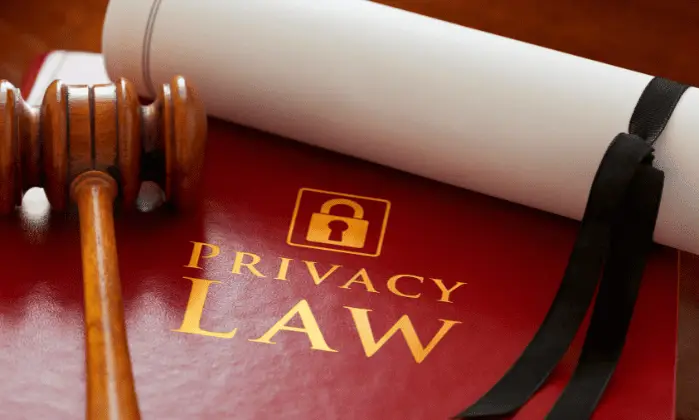Georgia Data Privacy Laws
Whenever you engage in an online activity, organizations collect information about you. Consumers expect businesses to care for their data and safeguard it from bad actors. Data privacy laws exist to set standards on what an organization can and can’t do with the information it collects. They also provide a means for consumers to hold businesses accountable for failing to safely secure their data after a data breach.

Home • What is a Data Breach? • Data Privacy Laws • Georgia Data Privacy Laws
- December 9, 2025
Class Action U connects consumers affected by a data breach with qualified legal representatives. An attorney can help you understand Georgia data privacy laws and take action to protect your rights as a data breach victim.
Georgia Data Privacy Laws
Several states have enacted major data privacy laws, including California and Virginia. Georgia may follow with new legislation that imposes restrictions on data collection and gives consumers greater control over their data.
One law under consideration recently in the state is the Georgia Privacy Protection Act. Its provisions include:
- Limitations on the collection and resale of consumer data
- Rights for consumers to decline collection of their personal data
- Penalties for organizations that fail to protect consumer data
The prospective law failed to pass the Georgia General Assembly’s 2025-2026 legislative session. However, it may be reintroduced next year.
Georgia's Data Breach Notification Act (O.C.G.A. § 10-1-912)
Under O.C.G.A. § 10-1-912, businesses have a legal responsibility to notify individuals affected by a data breach. The Act applies to any organization, including data brokers and collectors, that maintains the personal information of Georgia state residents.
If an organization discovers a data breach, it must take steps to inform victims expediently. However, companies may delay a notification if law enforcement believes doing so may compromise a criminal investigation. Additionally, breaches that affect more than 10,000 residents must be disclosed to national consumer reporting agencies.
Georgia Personal Identity Protection Act
The Georgia Personal Identity Protection Act applies to organizations that collect or transmit a resident’s personal information, including information brokers, commercial data collectors, and some state agencies. There are exceptions for government entities that maintain data for certain activities, such as traffic safety and law enforcement.
Personal information protected under the law includes an individual’s legal name and any of the following:
- Social Security numbers
- Driver’s license number
- Credit or debit card information
- Account passwords, personal identification numbers, and access codes
If an organization discovers a data breach, it must take steps to notify victims expediently via a letter, telephone notice, or email. An organization may use substitute notices, such as conspicuous posts on its website, if the cost of directly notifying victims exceeds a certain monetary threshold.
The Georgia Financial Privacy Act
Georgia follows federal financial privacy laws, including the Fair Credit Reporting Act and Gramm-Leach-Bliley Act. These laws require financial companies to advise on how they use and share your personal information.
Whenever you open a new account, you’ll receive a privacy notice that describes the organization’s data retention policies with respect to customers. The notice may include a list of ways you can opt out of some of the company’s data-sharing practices.
Companies subject to the Gramm-Leach-Bliley Act must securely store personal customer information collected, including names, addresses, phone numbers, banking details, and Social Security numbers. The law requires organizations to maintain adequate security in their information systems and take swift action if a type of data breach occurs.
General Data Security Requirements for Businesses
The Georgia Technology Authority maintains a set of policies, standards, and guidelines that it encourages businesses to adopt. Its recommendations include:
- Implementing a data storage and retention policy
- Following procedures to protect customer data when disposing of hardware
- Keeping a backup of critical systems information
- Defining data security practices in line with business objectives and applicable laws
Georgia expects organizations to make a reasonable effort to protect sensitive customer data and secure it from unauthorized users.
Recent Data Breaches in Georgia
There are numerous examples of data breaches in recent years that affected Georgia residents.
For example, in November 2024, Memorial Hospital and Manor was the subject of a cyberattack that compromised the personal information of 120,000 individuals. And earlier that year a ransomware attack targeted Fulton County’s phone, tax, jail, and court systems.
Georgia residents may also be affected by data breaches involving companies based outside the state. For instance, a May 2025 breach exposed usernames and passwords of over 184 million people across several websites and apps, including Google, Apple, Facebook, and Microsoft
What Is Personal Information Under Georgia Law?
Georgia law protects consumers’ private information, which includes:
- Driver’s license and passport numbers
- Biometrics
- Social Security number
- Medical information
- Date of birth
- Financial account balances
- Tax details
Companies must take care to prevent unauthorized access to a consumer’s personal information and dispose of it in legally approved methods, such as shredding or erasing records.

When Must Companies Notify You of a Data Breach in Georgia?
Georgia’s laws require companies to notify affected consumers of a data breach expeditiously but do not set a specific deadline.
A 60-day notice period applies to covered entities subject to the HIPAA Breach Notification Rule. Financial organizations covered by the Gramm-Leach Bliley Safeguards Rule must report data breaches that affect more than 500 people to the Federal Trade Commission within 30 days of discovery.
Notifications should go to any consumer affected by the breach. Within the notice, organizations can provide an overview of what happened, the type of information exposed, and steps consumers can take to protect themselves.
Your Privacy Rights as a Georgia Resident
Federal and state laws provide Georgia residents with special protections and privacy rights.
Right to Timely Notification
Businesses must notify you within a reasonable time frame if a data breach results in the exposure of your personal information.
Right to Protect Financial Data
Georgia expects organizations that retain your financial information to store and dispose of it securely.
Right to Seek Legal Recourse
Data breach victims may take legal action against organizations that engage in negligent data handling practices. Options include pursuing a legal claim and joining a class action lawsuit.
How To File a Complaint or Take Legal Action in Georgia
If a business entity fails to safeguard your personal information, consider taking legal action. Your efforts can hold negligent parties responsible and encourage other organizations to adopt safer data handling practices.
Filing Complaints With the Georgia Attorney General
The Georgia Attorney General’s Consumer Protection Division investigates businesses that violate state and federal laws. You can file a complaint online, by mail, or over the phone. The agency usually responds via email or mail.
Joining a Class Action Lawsuit
Some types of data breaches involve numerous people, making them well-suited for class action lawsuits. You can participate in existing class action lawsuits when your personal information is part of a data breach.
If there is no pending class action legal activity, it’s possible to initiate one by locating other impacted people and asking them to participate. Starting a lawsuit may enable you to collect financial compensation for your losses.
Seeking Legal Help and Resources
Georgia companies have a responsibility to store and transmit sensitive information securely. If an organization’s negligence led to the exposure of your personal details, you may take legal action to protect your rights and secure monetary damages.
Class Action U connects data breach victims with experienced attorneys who can explain your legal options. Get in touch today for a free, no-obligation consultation with a data breach lawyer.
